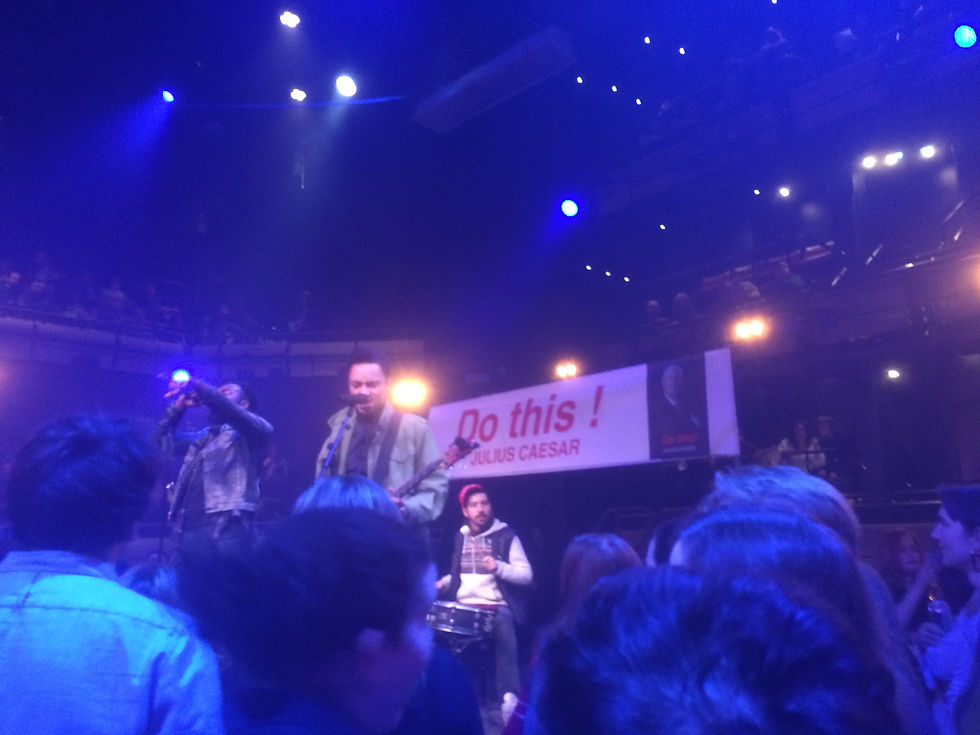Reviewing: Julius Caesar at the Bridge Theatre
- Charlotte Frost

- Feb 7, 2018
- 7 min read
DISCLAIMER: realised at the end of writing this that there may be some spoilers! Also, I can't remember the last time I wrote a theatre review - for uni I think?! So I feel like I need to state that this is not a formal review: this is all about my experience/interpretation of the production, and everyone's will be different. Enjoy!
Political character assassination is commonplace in the age of May and Trump. Just think about the multiple witch-hunts, from both sides, that have taken place in the Labour Party since Jeremy Corbyn became leader.
So it's easy to see why so many productions of Julius Caesar - Shakespeare's tale of literal political backstabbing - keep popping up on posters on the tube.

I had a friend couchsurfing with me for the weekend, so a show was inevitable. She was catching a matinee of Pinnochio, so I thought I may as well catch a show too, and meet her afterwards. So I scanned TodayTix - a great SKINT LONDONING tool! - and bagged a £15 ticket for Julius Caesar. I was over the moon - a Shakespeare play with alumni of Game of Thrones and Doctor Who in the cast, it was exactly my cup of tea!
However, I soon realised that I had booked a ticket for the evening performance - as it was still previews, there was no matinee! So we dashed to the box office in hope, and sure enough, there were a small number of returns! These were standing tickets, and we weren't really sure what to expect; aside from the helpfully vague advice given to us by the kind lady in the box office: "Make sure you move!"
We soon found out what she meant. We handed in our bulky coats and bags to the free cloakroom - remarkably well organised by theatre staff - and, after a quick photo op in the stunning bar, we headed inside.

The Bridge Theatre bar
The show is two hours straight through without an interval, so we picked our spot. Upon entering the stunning space - where towering seats are stacked in the round - you are immediately struck with the positively charged atmosphere of a festival, or a political rally. The opening of the play strikes both these notes, featuring live band renditions of “Seven Nation Army” and other politically-charged tunes.

The Intro
It soon becomes clear that this is a celebration - Caesar has triumphed over Pompey - and you are soon sucked into the world of the play.
The jaw-dropping moment for me was the first time the ground beneath us cracked open and shifted, creating different stage formations for each scene! This adaptable staging makes it easy to move with the characters from place to place, allowing the story to gallop along, and has the added benefit of preventing a "front-row" from forming - everyone has a chance to be up-close and personal with the action!
Phenomenal trust is placed in the audience, with the actors regularly walking and talking among us, and some scenes - including a rather brutal fist fight - are literally slap bang in the middle of the crowd. I was pushed and yelled at by theatre staff. (As a member of Front of House staff myself, I remember thinking: this is what I feel like doing to people who won't put their phones away during the show at work!) But this was for the clear purpose of keeping us safe by getting us out of the way! But more on that in a bit.
The acting was outstanding. It must be difficult - especially when your audience is surrounding you, staring up at you, their illuminated faces clearly visible - to shrink your circle of concentration appropriately. But this was always effectively done, particularly in portraying the complex relationships between the conspirators - creating that delicate balance of a secret meeting whilst letting the audience be party to the fluctuations of emotion crucial to telling the story.
Two standouts for me - and not just because they were the first women I've ever seen play two parts that have always been unquestionably male in my experience of the play, making me see the characters in entirely new ways - were Michelle Fairley's Cassius, and Adjoa Andoh's Casca. They brought just the right blend of hardness - of pent-up rage and vengeance - and softness - in their warmth and affection for each other that made their usually cold and militaristic characters far more empathetic.
Similarly, Ben Whishaw's quiet, bookish Brutus bordered on... adorable?! Definitely a take on the brutish conspirator and murderer that I have not seen in the past. The diverse cast all seemed to be fighting their own internal battles, and the strength of both the core cast and the multi-roling rock-and-rolling ensemble really carried the production for me. These subtle twists help give this ancient story a modern resonance.
The other standout performance, for me, was David Morrissey as Marc Antony: his emotional “Friends, Romans...” speech left the previously jubilant audience reeling, unsure which end of this fantasy political spectrum we fell. His revelation of Caesar’s body results in audible gasps, shouts, and the audience being hopelessly sucked into the madness of civil war.
I am a huge fan of this kind of immersive theatre - I believe that utilising sensory memory is one of the best ways of invoking emotion in your audience.
However, if I had one issue with this production, it would be that I was not sure how safe I felt at some points. Perhaps due, in part, to the fact that we were still in previews and the actors and staff were still getting the hang of the whole thing, but I was physically manhandled a couple of times: being pushed into piles of people and narrowly dodging flying limbs!
This was fine for me - I got super into it and was practically walking towards them, begging to get involved in the charges and fist fights taking place around me! However, for older or much younger - or less bold! - audience members, being crushed by crowds of people is probably not their idea of a great Saturday night.
Finally, for me, the play divided clearly into two parts - the deadly (relative) calm of roiling political turmoil, and then the vicious flashes and gunshots of the civil war. Two hours may not seem like that long to stand, when you are a Globe groundling regular like me, but there came a point where I could feel the audience getting fatigued. I even had one guy lean up against me! Hopefully he was just tired and not a complete weirdo... I hastily shrugged him off of me and he seemed to perk up!
I felt we could have used an interval to physically and emotionally garrison ourselves against what was to come.
However, in order to be clear, I must contradict myself - I feel like these fears that I’m expressing were actually unfounded: the staff were constantly on their toes, and the operation ran like clockwork. I chatted to a manager afterwards, whilst queuing to grab my stuff from the cloakroom. He asked me how I felt as part of the mob. I told him I was terrified at times, overwhelmed by the chaos and noise, and he replied that that was how I was supposed to feel!
As someone who has been on quite a few real-life marches, a few of which took on a claustrophobic or threatening atmosphere after a few hours, this made sense to me: it was a good way of feeling and exhuming the anger, frustration and fear that so many of us feel in these unstable, unsustainable times, in the safe (hopefully!) environment of the theatre. You feel the adrenaline, but you know that the bright lights are stage lights; the gunshots are sound effects; the people stabbing and shooting each other with such passionate vitriol are actors. In this way, putting forward Shakespeare's tragedies in this way makes for a deeply cathartic audience experience.
I also liked the fact that I ended the play not really knowing whose side I was on. I felt it was making a comment on the cult of personality. You are filled with a sadness at the tragedy of the story, and reminded that behind every political idea are complex, confused, self-contradictory humans.
BONUS SKINT LONDONING TIP!!


My Most Recent Visit to the Shearling High Level Walkway
One of my favourite ways to kill an hour or so, before or after a show, is to take a wander round the Shearling High Level Walkway in the National Theatre.
You enter through the Dorfman entrance, and go up one flight of stairs or take the lift, to be transported into the visually satisfying organised chaos of the backstage area of the National.
Every time I go there, I have a different experience, as they are constructing set pieces for different shows. It is usually very quiet, as no one really knows it exists! It is truly a hidden gem. Peaceful, warm and welcoming.
Usually, when I go there, there aren't many members of staff in, for some reason, but when they are there, it is strangely comforting to watch them casually carrying on with their jobs: you are watching from the gods, present, acknowledged but separate.
The exhibition is short, culminating in a room where you can watch a video, see out into warehouses on two sides, and have a tactile experience with textiles really used in shows.
Small though it may be, the attention to detail in this exhibition is immense, always engaging with what's currently going on in the self-contained world of the National Theatre. It is modern, accessible and interesting.
I have been there before, with a friend, and spent half an hour just standing and talking, undisturbed; to me, it is really an oasis of calm connection in the emotional desert of London.
So if you ever find yourself in Central on a cold, unfriendly day, and need a space to breathe, daydream and/or keep your brain busy for a little while, I recommend this spot to you.
Yours,
Char
xxx








Comentarios